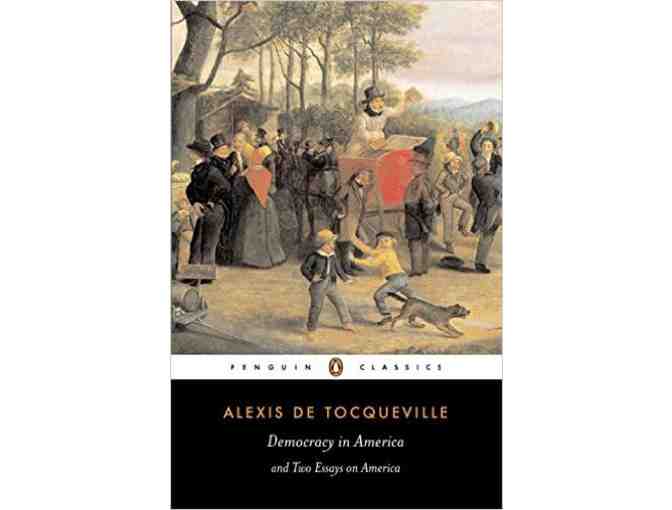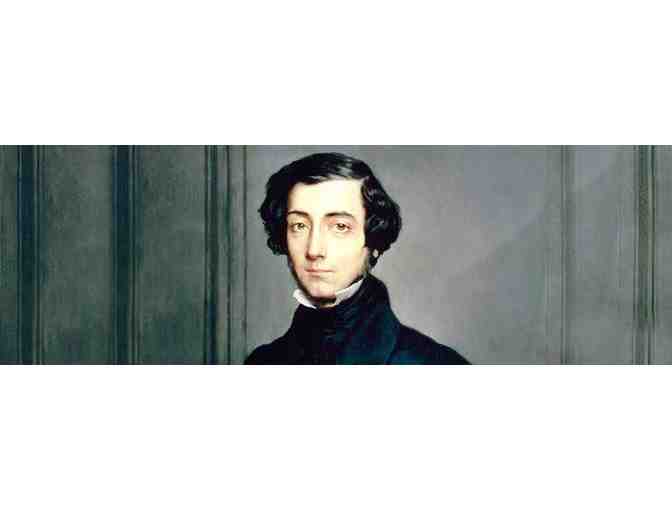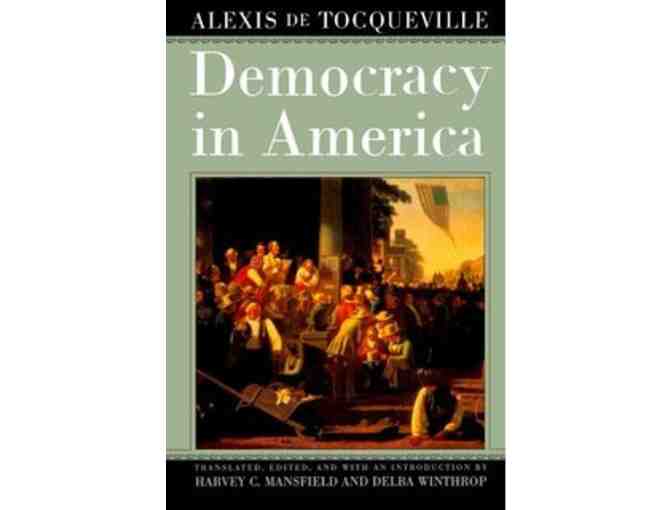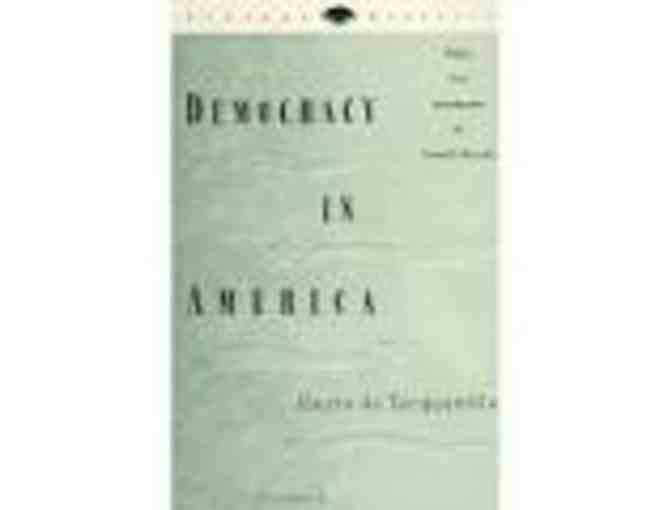Books
"Democracy in America" by Alexis de Tocqueville! On CA's Recommended Reading List
- Item Number
- 148
- Estimated Value
- 15 USD
- Sold
- 18 USD to rm9af22c4
- Number of Bids
- 3 - Bid History
Item Description
This book is on Constituting America's Recommended Reading List, which is a rich resource of information and insights about the our nation. It is taught in American History and Studies throughout the U.S. It is readable and an amazing book to discuss with young and old. We bring this to the auction with pride and know you will enjoy adding it to your library as the classic it is.
A contemporary study of the early American nation and its evolving democracy, from a French aristocrat and sociologist.
"Democracy in America is a classic of political philosophy. Hailed by John Stuart Mill and Horace Greely as the finest book ever written on the nature of democracy, it continues to be an influential text on both sides of the Atlantic, above all in the emerging democracies of Eastern Europe. De Tocqueville examines the structures, institutions and operation of democracy, and shows how Europe can learn from American success and failures. His central theme is the advancement of the rule of the people, but he also predicts that slavery will bring about the 'most horrible of civil wars', foresees that the USA and Russia will be the Superpowers of the twentieth century, and is 150 years ahead of his time in his views on the position and importance of women."
In 1831 Alexis de Tocqueville, a young French aristocrat and ambitious civil servant, set out from post-revolutionary France on a journey across America that would take him 9 months and cover 7,000 miles. The result was Democracy in America, a subtle and prescient analysis of the life and institutions of 19th-century America. Tocqueville looked to the flourishing deomcratic system in America as a possible model for post-revolutionary France, believing that the egalitarian ideals it enshrined reflected the spirit of the age and even divine will. His study of the strengths and weaknesses of an evolving democratic society has been quoted by every American president since Eisenhower, and remains a key point of reference for any discussion of the American nation or the democratic system.
This new edition is the only one that contains all Tocqueville's writings on America, including the rarely-translated Two Weeks in the Wilderness, an account of Tocqueville's travels in Michigan among the Iroquois, and Excursion to Lake Oneida.
For more than seventy years, Penguin has been the leading publisher of classic literature in the English-speaking world. With more than 1,700 titles, Penguin Classics represents a global bookshelf of the best works throughout history and across genres and disciplines. Readers trust the series to provide authoritative texts enhanced by introductions and notes by distinguished scholars and contemporary authors, as well as up-to-date translations by award-winning translators.
Item Special Note
"Democracy in America," by Alexis de Tocqueville, was written following a 9-month long exploratory voyage to the United States back in 1830. In the book, the French author analyzes the political and sociological aspects of the American democratic regime and contrasts his findings with the situation of the people living under the aristocratic regimes of France and England. Tocqueville spends a great deal of time praising the political and legal system of the United States as he tries to sell democracy to his contemporaries in Europe. He also uses his writing to warn of the possible downsides of democracy, such as the potential for extending the principle of equality and turn the democratic regime into a tyranny of the majority. "Democracy in America" remains to this day one of the most important books ever written about the democratic system and its consequences.
America's first Europeans sailed from England in the early 17th century to settle in Virginia in the southern part of the country and in New England in the north. The colonies of the South were populated by gold and silver diggers seeking fortune, while those of New England were mostly filled with Puritan refugees seeking to build a new world based on their rigid religious principles. Both colonies built their political and social systems independently from England and eliminated the rules of aristocracy. The principles of sovereignty of the people, equality of conditions, and liberty that grew out of the colonies of New England were used to establish modern democracy of America.
Following the American Revolution, the principles of democracy were written into laws. Governmental power was distributed between the federal level and the States, resulting in a country where government administration was highly centralized, but where the executive power was distributed among States, county and township governments. Local administrations are elected for limited terms and remain under the control of the people.
Peace is an essential component of freedom; since America is protected from potential invaders by two oceans, it has an enormous advantage over the countries of Europe in establishing and maintaining the freedom of the people. The political parties of America compete for power and rely on two free institutions: the free press and the freedom of association. The free press allows the people to stay informed about the ongoing debates and issues. The freedom of association allows minorities of all types to be heard and to exert pressure on the elected.
The Federal Constitution provides a system of checks and balances between the legislative and executive branches of government at every level. A potential danger exists for democracies to extend the principle of equality of conditions to the point where it turns into a despotic regime. However, the American laws and decentralized political power protect the country from turning democracy into a tyranny of the majority. The people of America submit to the laws of their country, because they recognize that more wisdom exists in the opinion of a number of men than in the opinion of a single one.
Democracy is responsible for a number of the differences between the manners and attitudes of the Americans and that of the typical European citizen. Religion plays an essential role in America, because it maintains the moral values necessary to prevent the social grid from falling apart. Religion and politics do not mix, each occupying its own sphere in the public domain. Americans are generally not interested in philosophy or theoretical science, because they are fundamentally materialists and pragmatic. For similar reasons, their literature is limited in scope and is mostly interested in the passions and complications of life that can be shared by a majority of readers.
The principle of equality of conditions is very important to the people of America; however, it also presents a clear danger to democracy as it can be used to take away individual freedom. The participation of the people in the political process is essential to the survival of American democracy, because it allows people to feel their dependence on each other. Materialism and individualism are side effects of the democratic system that helped create a new type of aristocracy based on wealth. However, democracy has positive effects on family relationships and on the mutual respects of the individuals."
Constituting America stores data...
Your support matters, so Constituting America would like to use your information to keep in touch about things that may matter to you. If you choose to hear from Constituting America, we may contact you in the future about our ongoing efforts.
Your privacy is important to us, so Constituting America will keep your personal data secure and Constituting America will not use it for marketing communications which you have not agreed to receive. At any time, you may withdraw consent by emailing Privacy@frontstream.com or by contacting our Privacy Officer. Please see our Privacy Policy found here PrivacyPolicy.




